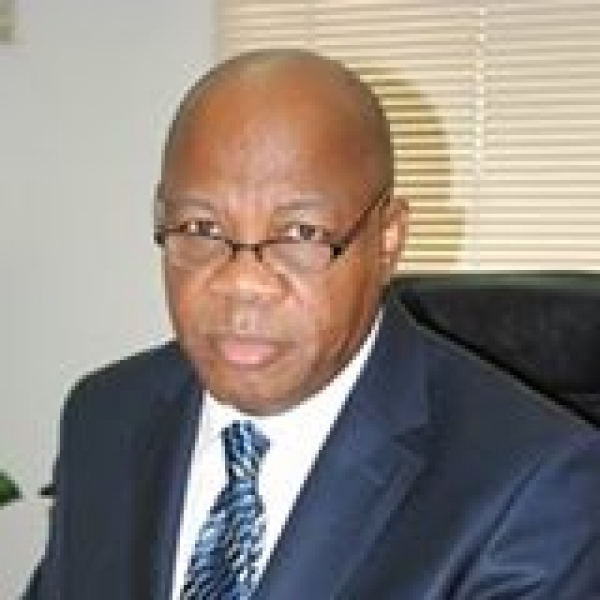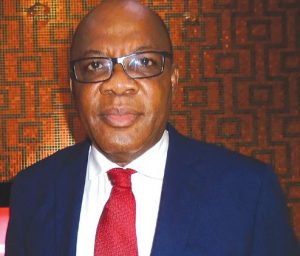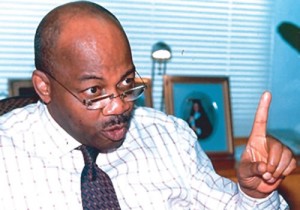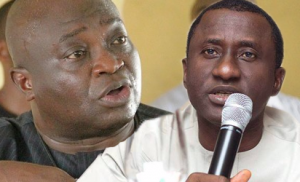
LAGOS, Federal Republic of Nigeria. Olisa Agbakoba, a Senior Advocate of Nigeria (SAN) and former President of the Nigerian Bar Association (NBA), spoke to Daily Independent. Excerpts:
The Chief Justice of Nigeria (CJN) recently lamented that there are about 5, 000 cases pending….
Cuts in….It is their fault. What do they do? A CJN comes in, makes a big speech about the problem… he does nothing until he is going and then in his valedictory, he tells the incoming CJN this is what you should do… That is the problem… What has he done? I was on the National Judicial Council (NJC) myself. I was on the NJC responsible for speed of justice and the question is what has the CJN done?
Everything is talk, talk, talk and nothing is done. We don’t do anything but talk. Let our political leaders walk the talk.
But recently, the Chief Jude of the Federal High Court, Justice Ibrahim Auta said lawyers are the biggest threat to the judiciary, with their frivolous applications to delay cases, especially the ones that are against their clients. How do you react to that?
It is not true. For example, in the game of football, even when John Mikel Obi of Chelsea Football Club accused the referee of racially abusing him, what happened? Mikel was punished. The judge is master of his court. One of my good friends who has some challenges with his appointment as a judge exhibited for me the true calling of a judge.
He can finish a case in one day. The judicial function is equivalent to a man going to see a doctor for malaria. You don’t want to have nine years going to see your doctor. So, it is incumbent on judges to ensure speedy determination of cases, not lawyers. The judiciary must work in tandem and know the lawyers that file frivolous applications and isolate them. The point I’m making is if I’m a judge and a frivolous application is filed, for instance, there was one frivolous application that was filed before a judge who is a friend of mine. The application was in respect of a newspaper that was owing. He said you want to wind up this newspaper, but I read it every day; maybe the man is owing you, and so it is not a winding up matter, it is a debt recovery and I will not be used in this way. He then struck it out. In the old days when we used to practice law at the Bourdillon Court of Appeal, the experienced appeal court judges by looking at the briefs would say, you as the appellant, you are supposed to talk first, but we don’t feel you should say anything, respondent, tell us why we should not grant his request. Then you see the respondent shaking.
Today, the thing has gone down but in the old days of strong judges, before they come out they already know and so they give judgment on the spot. So, it is a weakening of institutions that is our problem across the field. So, when the CJN said there are about 5, 000 cases, I ask him what are you going to do about it beyond saying it? In England now, the Supreme Court does not wear this robe and sit on a throne. They discuss cases with lawyers in a room in a very informal setting. The point is our judiciary needs to have the best international tools to do their job. Most of these cases you see, there is nothing in them. There are very few people that really have cases, but lawyers cluster it up or ineffective judges who don’t know what to do make it sound as if they are big. We have less than competent people across board and that ought to stop for Nigeria to be a good country.
But in your view, what is really the problem with the people in authority in terms of the deceit in government? Is it that people with ideas don’t get into positions or they don’t take advice from good people?
Good. I think the problem is with the political elites. They are motivated by their lust for greed and not by their desire to do good and that is the problem. So, immediately they get elected, whether at the Local Government platform or House of Assembly platform, they are thinking of the resources that will come to them personally. I can tell you that my Law Firm has submitted over 5o legislations to the National Assembly. Apart from the CABOTAGE Act, I don’t think any has passed because that is not their interest. When we engaged them, they are not interested; they are interested in what will come to them. So, for the period they are there, they don’t do anything for you. Those are the issues we should be putting to the PDP and APC.
How do you think internal democracy within the political parties can be strengthened?
I think we have to understand the real issues before we talk about the issue of internal democracy. You see, the reason why many are in politics is to make money. So, Ameachi lines up to be Governor of Rivers State on the PDP platform; Celestine Omehia did not take part but the internal democracy of the party reverses itself and the man who took part and won is removed and the man who did not take part is put in. Why is this happening not just there but across Nigeria? It is because of that lust that I have been talking about. I don’t think you guys understand the tremendous impact that winning an election in Nigeria makes in your life. People are underestimating it. Here is a man who can go from zero naira to a billionaire and so they are prepared to kill; they are prepared to do anything. I have taken part in election petitions to understand how the process is subverted. But I think all these goes to INEC because a strong referee, if you watch football, controls the match. A strong umpire controls the system.
INEC has a great part of the blame to bear because they are the ones who have power to accept. In every primary election, INEC must be present and they make their observations. What I noticed is that INEC is not really playing that regulatory role, which is why at the Uwais Panel, which I was a member, we recommended that INEC ought to be unbundled. INEC is doing far too many things; INEC is like the biggest printer in Nigeria, I hope you know that? They register political parties; they prosecute electoral offences and then they do the most crucial which is conducting the election and declaring the winner. If you liken it to a football match, I’m assigned to be the referee between Nigeria and Ghana. I have to procure the field; I mark the field; I put up the goal post, linesmen and everything I do. I will not be efficient. My job is to come with the whistle. That should be INEC’s new job. Everything around INEC that is not central to that function should be removed and therefore at the Uwais Panel, we recommended the establishment of Political Parties Registration Agency. It is their function to determine the political party that qualifies to be on the book. INEC has no capacity to do that and that has not happened. If INEC actually use the whip, the issue of internal democracy will be over because it is INEC that receives the names and so if you won an election and they took your name to INEC, the same INEC will receive the list and another list from the party. What happened in Anambra was very instructive because there were four factions and all conducted primary elections and all sent names to INEC. So, INEC without understanding why it was accepting the list, kept on receiving list and I believe Professor Jega, the Chairman of INEC was not even aware of that because one man cannot supervise 774 Local Governments. So, INEC is too big to carry out the function of political party registration, electoral umpire and the likes. Internal democracy is a function that the new INEC should be supervising. Once that happen and people know that you cannot commit a foul without a red card, they will not do it. So, INEC has to be stronger.
What is your idea of how federalism can be properly practiced?
I think after the dancing and celebration of May 29, the winner should clearly implement programmes and policies that will bring about federalism. First, there is nothing like true federalism, but to borrow the popular wrong use of phrase, true federalism means putting the Constitution on the table and distributing powers. I mean look at structure of journalism for example. The mission of most journalists is to put the paper to sleep. Do you know the energy and precision it takes to get a paper published every day and distributed? I wish politicians will think like that because even before getting to office, the Editor is already thinking of how the paper will look like the next day. He will be thinking of how to get his correspondents to send stories. He cannot be here conducting this interview and that is distribution power. So, why do we have only one President whereas we have at least seven presidents? One in Abuja, and one each in the geo-political zones. It will make the 98 items of power simpler. That is federalism.
Credit: Daily Independent (Nigeria)




